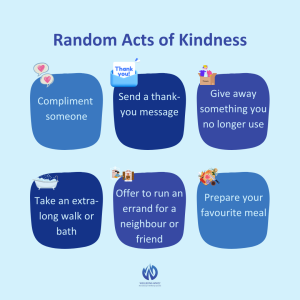Every year on February 17th, we celebrate Random Acts of Kindness Day. This special day encourages us to step out of our routine and inject a little love and compassion into the world—and into our lives. But what is Random Acts of Kindness Day, and why do we celebrate it? More importantly, how does participating in this day benefit us, regardless of our neurotype?
What is Random Acts of Kindness Day? Random Acts of Kindness Day began as a simple idea: to make the world a better place by encouraging small, helpful gestures without expecting anything in return. This could be anything from giving a compliment to helping someone carry their groceries. The beauty of this initiative lies in its simplicity and the ripple effect it creates in communities worldwide.
The Origins of Random Acts of Kindness Day The concept of Random Acts of Kindness Day emerged from several different movements and is often linked to Anne Herbert’s phrase, “practice random kindness and senseless acts of beauty.” The day was officially recognised in 1995 by nonprofit organisations aiming to inspire kindness throughout the world. The premise is simple: kindness is contagious, and even the smallest gesture can contribute to a larger change.
The Neurological Benefits of Kindness Research shows that kindness benefits our brains, regardless of our neurotype. Engaging in acts of kindness produces serotonin, a neurotransmitter responsible for feelings of satisfaction and well-being. This reaction is true for all people, including those who are neurodivergent. Neurodivergent individuals, who might experience the world more intensely, can feel particularly uplifted by both receiving and giving kindness.
The Often Neglected: Ourselves It’s easy to be our own worst critics. Many of us routinely overlook our accomplishments and focus instead on our shortcomings. This can lead to a negative self-perception and diminished mental health. Random Acts of Kindness Day is a perfect opportunity to reverse this trend by being kinder to ourselves. Simple acts of self-care or self-compassion can lead to significant improvements in our overall well-being.
Ideas for Practicing Kindness So, what can we do today to be kind to others and to ourselves? Here are a few simple ideas:

- Compliment someone genuinely. It can brighten their day and yours.
- Write a note of thanks or appreciation—and maybe one to yourself, too, noting what you’re proud of.
- Cook a meal for a friend, or treat yourself to your favorite food.
- Take a longer route on your walk and invite a friend or a family member to join you.
- Offer to help someone with a task, or give yourself an afternoon off.
- Call a friend or family member you haven’t spoken to in a while, or take some time to disconnect from digital devices and reconnect with yourself.
Random Acts of Kindness Day reminds us that kindness is a powerful tool for social change and personal well-being. Whether it’s showing kindness to others or to ourselves, each small act contributes to a healthier, happier society. So today, let’s choose kindness—intentional, simple, and with profound effects. Let’s make kindness not just an annual event, but a daily practice.

